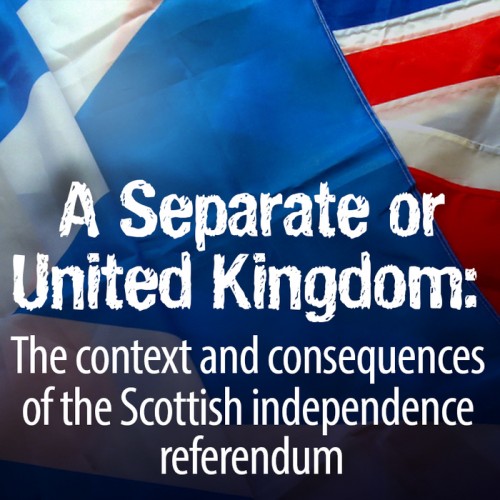‘You can be proud to be English and British’, Labour party leader Ed Miliband told his party conference. Yet the Labour leader ducked the question of England’s place within the next stage of devolution, instead warning that Prime Minister David Cameron’s raising of the issue of ‘English votes for English laws’ could divide the UK.
Labour’s complaint – that the Prime Minister’s raising the question of English votes for English laws was simply a partisan ambush – is unconvincing, because it fails to answer the key questions.
Any party which wants to be part of the conversation needs to decide what it is offering to England and the English.
It was both predictable and unavoidable that the role of England within devolution would arise, after a referendum in which the major British party leaders made a vow of more powers to Scotland.
If ‘more powers to Scotland’ is the right response to democratic pressure, it is incoherent to argue that some measure of English devolution must prove divisive.
The charge of party interest from Labour voices sounds very much like a case of pots challenging kettles. No doubt all politicians keep the party implications of political reforms in mind but Labour’s own partisan interests, particularly representing 41 of the 59 Scottish constituencies in the House of Commons, would appear to be playing a significant role in the party’s difficulty in articulating any coherent view about England’s place in the evolving constitution of the United Kingdom.
That core principle is simple: devolution to Scotland, Wales and Northern Ireland makes the issue of a fair say for England important and unavoidable.
The answer has to be that England should get what England wants.
But what does England want? Nobody can yet be certain of the detail of that.
Here, the proposal of an open and inclusive process is valid – but it has a power only once the core principle has been accepted and agreed. Otherwise it will look, to most people, like an attempt to kick the question into the long grass and to hope it does bit return.
Some form of constitutional convention could usefully be contrasted with the limits of deciding on devolution to England in a Cabinet sub-committee in Whitehall – but only if it is deciding on how to represent England, rather than whether to do so. It should also offer a clear timescale for an outcome to be implemented, as is the case with the Scottish vow.
We do know that England wants the United Kingdom to continue, and to remain part of it. Many predicted that the English view, by the time Scotland voted, would have curdled into ‘why don’t you get lost’. The opposite was true. The vocal minority who wanted Scotland to leave remained stuck at under one in five, and support for the UK grew.
Most of the English accept that Scottish devolution reflects what Scotland wants. They also expect to have a fair say themselves. As the IPPR has shown in its detailed tracking of attitudes, the felt asymmetry of the current devolution has become more and more salient over the last decade.
But there are many alternative approaches to how to give England a voice. A minimalist version of an English legislature would see the existing English constituency MPs wearing two hats, perhaps on different days of the week. This appeals to existing MPs and would avoid the problem of the additional costs of more institutions and more politicians.
The technical questions about how to define English legislation, and when bills have knock-on effects, are not impossible to sort out, as the Mackay commission report has shown. The powers devolved to the Welsh assembly will also have a bearing on which issues are England-specific and which affect England and Wales.
The political objection that a government without a majority of English MPs may not have a majority for English-only bills is unpersuasive. After all, there are two straightforward political solutions to this dilemma: a party could win more votes and seats in England, to avoid that headache; or it would have to seek broader support for its proposals, rather than whipping laws through. Combined with stronger parliamentary committees doing more substantive pre-legislative scrutiny, that could well be a recipe for better laws.
Times commentator Tim Montgomerie has proposed that a new English parliament should be located in the north, trading in the Lords in return.
That could send a powerful message that devolution shouldn’t stop within Westminster.
Others think a reformed second chamber could play a central role in providing an English legislative forum.
One-size-fits-all regionalism will have a very limited appeal, but there will certainly be pressure to ensure that devolution involves greater powers being devolved to local government, and to cities and counties who want them.
In contrast to Scotland, where there was a significant amount of civic engagement ahead of devolution, there has been no significant English public involvement to date over what form of devolution people want.
It is simply a mistake to say that nobody cares about these issues. Few have paid any attention to the precise details of alternate constitutional models. But there is a broad and growing sense that there does need to be a fair approach.
The issue of English voice is not just about political representation but about the cultural recognition of Englishness.
This plays a crucial part in many of the major political debates of our times, being particularly significant in debates about both immigration and Europe.
That is why any party needs to have an account, as the United Kingdom evolves, of what is fair to England.
It is also surprising that the Liberal Democrats, given their interest in constitutional reform and the possibility of federal approaches to ‘home rule all round’ have not sought to have a stronger public voice on English representation since the Scottish vote.
If Labour is not careful, it could end up achieving the unenviable combination of being portrayed as the party of Westminster in Scotland, and the party of Scotland and Wales in England.
There is a growing number of Labour voices at all levels in the party who will be keen to ensure that their party is not left out of this national conversation, though loyalty to the leadership muted this challenge during the party conference.
Because Labour failed to answer the question properly while the political spotlight was on them during their conference, English Labour voices will now find themselves playing catch-up as they seek to make the case that their party should also have its own distinctive contribution to make to this debate about how England’s voice will be heard.
This piece first appeared on OurKingdom and the British Future’s blog.








1 Comment
Labour is already viewed as the party of Westminster in Scotland. Ever since 2007.